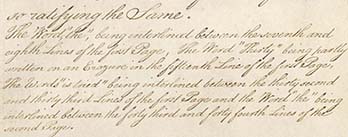Not long ago, the Gazette‘s editor and vice-president for news, Scott Angus, wrote about a mistake that newspaper made when it reprinted an old section of the paper in a current edition (See, subscription required, Editor’s Views: Wrong page prompts headscratching, thorough review.)
Mistakes of proofreading and printing happen from time to time, even a newspaper that employs dozens. No human institution runs to perfection — this truth is both to the Gazette‘s consolation and remorse.
It’s a consolation because readers understand that, occasionally, a paper (or website) will make publishing errors. Workers in any field, no matter how committed to quality, make occasional mistakes.
It’s true of advanced fields like aerospace, and it’s true of local newspapers and websites.
Understandably, Mr. Angus worries that readers will doubt that his paper cares about them, but I’d guess most people are forgiving of mistakes now and again. The Gazette has, therefore, reason for consolation.
They’ve also reason for concern: in an undertaking in which style matters more, and substance less, readers will be unforgiving of mistakes.
A newspaper standing on sound principles, first and foremost, can weather typographical errors, as substance trumps printing. By contrast, in conditions where clear positions are less evident, operational mistakes become more noticeable and damaging by proportion.
Here’s an easy proof, concerning the Constitution. Consider, from Dr. Henry Bain’s essay, some typographical mistakes in early copies of that federal document:
A close study of the way the Constitution has been put on paper—either written or printed—during its long life is sure to call our attention to its smallest faults—its errors of penmanship and typography.
It is not surprising that a few such errors have crept in during all these years, while the original Constitution and an ever-growing body of amendments were written out on a few occasions and printed thousands of times. Most of the errors of the scribes and the typesetters were promptly corrected before we, the reading public, had a chance to notice them, but a few have endured in successive publications.
In fact, Jacob Shallus, assistant clerk of the Pennsylvania legislature and scribe for an early copy of the document, even listed mistakes he’d made:

No one blames, Shallus, though, because he was working hard under a demanding deadline, and even more because the substance of the document is what matters most.
Substance mitigates occasional procedural or mechanical errors.
Now Scott Angus has been at the Gazette for years, is well-regarded as smart and dedicated, and comes from a newspaper background (his father was a newspaperman). But one such editor or a dozen like him couldn’t achieve a perfect paper.
It’s not to procedure, operations, or mechanics that a publication should look for strength; it’s substance that carries the day.
Next: The Gazette’s Ideological Albatross
